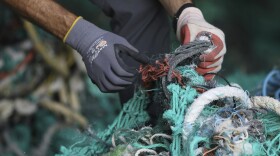Today as we planned to offer a preview of a sobering Helping Hand segment we’ll have next Friday based around the world’s most trafficked mammal, a toothless, defenseless animal, unfortunately this most vulnerable creature has made news now on back-to-back days with unprecedented, record setting seizures of their body parts, both headed to the same Asia Pacific country, as conservationists say with these kinds of mind-boggling busts, extinction appears inevitable.
Next week on Helping Hand we’ll have a segment devoted to the pangolin, only now gaining attention in the west as the shy scaled mammal has been thrust into the role as a sort of mascot for the rapidly growing wildlife crisis threatening extinction to numerous species, virtually all of it caused by Asian consumers, largely in China and Vietnam.
On next Friday's Helping Hand, we’ll hear about a "Pangolin Party" Saturday February 16 at Kualoa Ranch by the local Wild Aloha Foundation, designed to bring awareness to their plight, one of many similar events taking place on World Pangolin Day.
The world’s most trafficked mammal, a seizure announced yesterday, described by the AP as a “staggeringly large bust”, had two Vietnamese in Uganda arrested with three tons of elephant tusks and a half-ton of pangolin scales, bound for Vietnam. But it was nothing compared to what customs officers in Hong Kong announced today: 8.3 tons of pangolin scales and hundreds of elephant tusks, also headed for Vietnam; the AP said it underscored “the threat to endangered species from demand in Asia”; two were arrested in the largest-ever seizure of pangolin scales in Hong Kong, representing at least 14,000 pangolins.
With a rapidly growing Chinese and Vietnamese middle class, the AP reported in the last two decades, the number of pangolins worldwide has dropped by about 90 percent. “It is clearly impossible that the pangolin species can withstand such high rates of poaching, trafficking, and trade” said Alex Hofford, a Hong Kong-based campaigner with non-profit group WildAid told Quartz. Sophie Le Clue, director of the environmental program at ADM, summed it up this way to the online news source: the “massive increase” in pangolin seizures in the past five years “signal the likely extinction of the species.”




